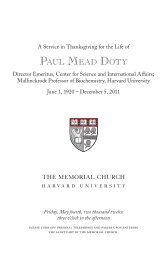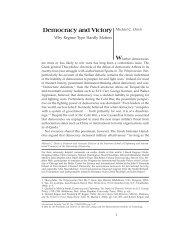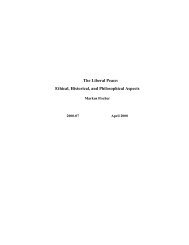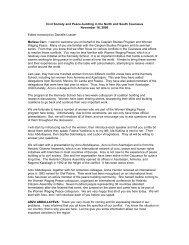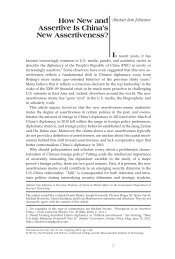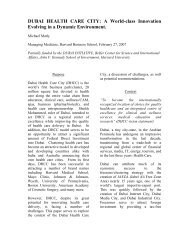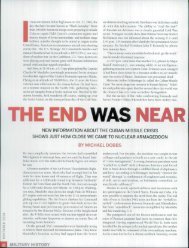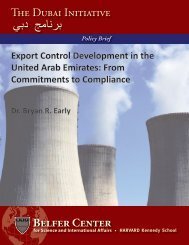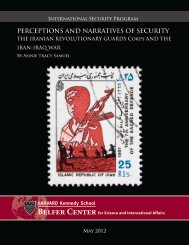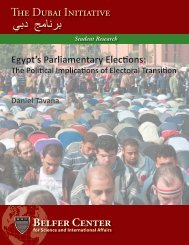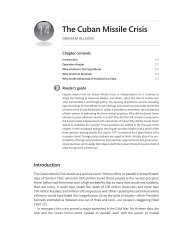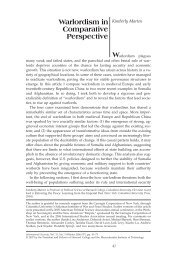The Cuban missile crisis and intelligence performance
The Cuban missile crisis and intelligence performance
The Cuban missile crisis and intelligence performance
Create successful ePaper yourself
Turn your PDF publications into a flip-book with our unique Google optimized e-Paper software.
Downloaded by [Harvard College] at 08:23 18 September 2012<br />
184 INTELLIGENCE AND THE CUBAN MISSILE CRISIS<br />
<strong>intelligence</strong> community had attempted to provide estimates of the<br />
intentions <strong>and</strong> capabilities of important foreign countries. While these<br />
estimates often evinced the flaws of committee-generated reports,<br />
they at least reflected an effort to coordinate <strong>and</strong> make sense of secret<br />
knowledge on a certain policy matter. In some cases, these reports<br />
sought to clarify the murky world of the subjunctive, to illuminate<br />
what might happen. Called '<strong>intelligence</strong> estimates' in the Anglo-<br />
Saxon <strong>intelligence</strong> world, these reports were foreign to Soviet<br />
experience. In Moscow, 'what if questions were reserved for the<br />
consideration of the Presidium alone. 38<br />
This does not strike us as quite right. 'What ifs' are an inherent part of threat<br />
assessment. As Fursenko <strong>and</strong> Naftali themselves note, the KGB was tasked<br />
to provide an assessment of US intentions toward Cuba several times - for<br />
example, immediately after Aleksei Adzhubei's meeting with President<br />
Kennedy in January 1962" - <strong>and</strong> in some of these assessments, the KGB<br />
attempted to identify hypothetical conditions under which the United States<br />
might attack. An especially interesting example of this was a July 1960<br />
estimate that a US invasion of Cuba was unlikely unless the <strong>Cuban</strong>s invaded<br />
the US naval base at Guantanamo Bay or unless the Soviets attempted to<br />
station nuclear <strong>missile</strong>s in Cuba." 0 This estimate - which Fursenko <strong>and</strong><br />
Naftali imply had never formally been withdrawn or revised — was, in our<br />
view, a quality piece of <strong>intelligence</strong> that certainly should have given<br />
Khrushchev pause had he not been so convinced (for whatever reason) that<br />
the deployment would succeed.<br />
While it may well have been unusual for Soviet leaders to pose direct<br />
'what if questions to the KGB, it was not unusual for the KGB to consider<br />
them. But more to the point, the organizational culture of Soviet <strong>intelligence</strong><br />
cannot explain this particular failure well because the real question is not<br />
simply 'why was the KGB not tasked to assess the likely US response to a<br />
nuclear <strong>missile</strong> deployment?', but why was nobody asked? Quite simply,<br />
Khrushchev did not think it necessary. He was the kind of man - headstrong<br />
<strong>and</strong> brimming with self-confidence — who did not feel the need to ask the<br />
experts. 41<br />
2. Did <strong>intelligence</strong> play any role in Khrushchev's judgment that the<br />
deployment would succeed? Troyanovsky's testimony highlights<br />
Khrushchev's deductive approach to forecasting; but there was <strong>intelligence</strong><br />
available that could have buttressed Khrushchev's confidence. A 'highly<br />
regarded source' indicated to Feklisov in March 1962 that Kennedy would<br />
not risk military action against Cuba before the mid-term congressional<br />
elections in November. 42 This report could have encouraged Khrushchev to



